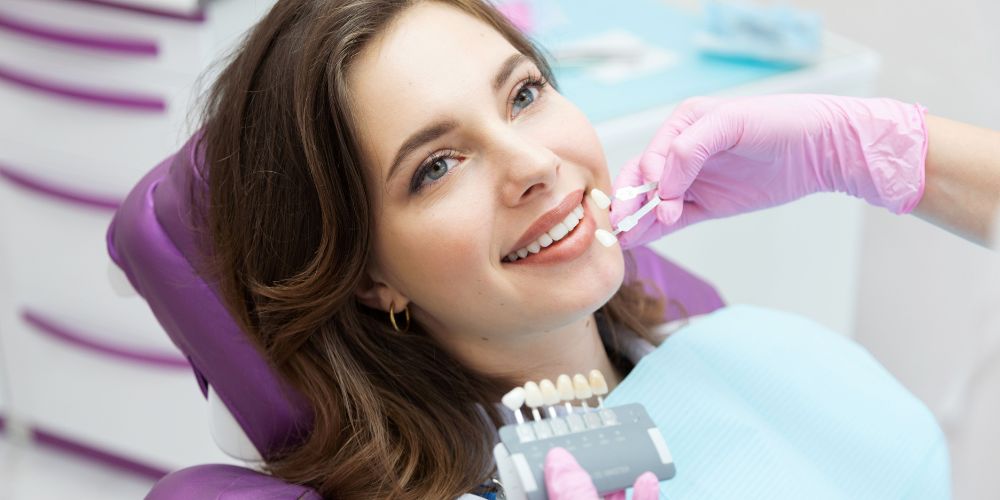Offered the chance of a picture-perfect smile, few people would turn down the opportunity.
Or would they?
A study by market research platform DentaVox, revealed that 61% of people suffer from dental fear, with 4% never venturing to the dentist. And the biggest fear factor in all of this?
Pain.
39% of the 18,000 people quizzed from across the globe sighted concern about the level of discomfort they may have to endure as their biggest worry.
Add to that the dread of additional pain post-treatment, and it appears many nervous patients could be letting a lack of understanding about the healing process of veneers stand in the way of a great-looking smile.
Don’t miss out!
Read on to understand more about what to expect in the days, weeks, and months following treatment.
CONTACT USWhat to expect during the procedure
The good news is that having veneers does not hurt.
Depending on the scale of your treatment (and personal pain threshold) a small amount of discomfort may be experienced, but most patients report that this is only very mild.
In some cases, local anaesthetic may be used. A quick sharp scratch can be felt as this is administered but all other sensations will be completely numbed.

Immediately after your appointment
Once treatment is complete, you may experience:
- Numbness
If an anaesthetic has been used, your mouth will feel numb for several hours after the treatment. This will gradually wear off and full feeling will return.
- Tenderness around the gums
It’s common to experience a little soreness around the gum line. This is nothing to worry about and will subside very quickly. You can manage any pain with over-the-counter medication if needed.
- Tooth sensitivity
It’s normal for teeth to feel sensitive post-treatment, this is just them reacting to having the veneers applied. Some patients describe feeling a mild throbbing sensation for several hours after treatment and/or as any anaesthetic fades.
Allow teeth time to settle and avoid overly hot or cold food and drinks to avoid exacerbating the sensitivity.
- Problems adjusting to bite
Properly fitted veneers will not hinder biting or chewing, so there’s no need to be concerned if your bite feels a bit strange at first. It will just take a little time to adapt to the new feeling of having veneers.
- Changes to speech
Don’t panic if your voice sounds a little different when you first speak after having treatment. Many people develop a slight lisp when veneers are first fitted – this is nothing to worry about. Your speech will soon return to normal once your mouth becomes accustomed to the veneers being in place.
BOOK A FREE E-CONSULTATIONHow long is the veneer healing process?
Most people feel like they’re completely comfortable with their new veneers within about two weeks.
By this, we mean any sensitivity and discomfort have subsided, and speech and bite have returned to normal.

Can you speed up recovery?
It’s important to point out that many people don’t need a ‘recovery’ period with veneers – they feel great and get back to a normal routine straight away.
For others, the healing process can be a little slower – but there are a number of things you can do to help speed things up. Including:
- Avoid extreme temperatures
Staying away from overly hot and cold food can help to avoid aggravating any sensitivity experienced. Opt for lukewarm or room-temperature foods and try drinking through a straw to bypass the teeth.
- Avoid overly hard foods
If teeth are feeling a little delicate, it’s advisable to avoid eating anything that is too hard, chewy, or crispy. Think soft and gentle and give your teeth a little TLC while they settle back down.
- Resume regular brushing
If teeth and gums are tender it can be tempting to swerve your usual cleaning routine. But to aid a speedy recovery, it’s important to get back to regular brushing and flossing straight away – just go gently.
VIEW OUR FEES PAGEVeneers aftercare
Veneers aftercare is crucial if you’re going to maximise the look and life expectancy of your treatment.
All the rules that apply to natural teeth still stand when you have veneers. So, to optimise their lifespan (which can be upwards of 15 years), you should:
- Resume your normal routine
Although teeth and gums may be a little tender at first, it’s important to resume brushing and flossing straight away. As a guide, you should aim to brush for two minutes at least twice a day.
The ideal time to brush is after every meal, although for many people this isn’t practical. Instead, aim to clean your teeth after breakfast and last thing at night – just before you go to bed.
Remember to use a fluoride toothpaste and not to rinse your mouth with water after brushing as this dilutes the positive effects of the fluoride.
Electric toothbrushes are a worthwhile investment too and are still safe to use with veneers. Not only do they help to promote more thorough brushing, but they also usually run on a timed setting – so you can be confident you’re dedicating enough time to your cleaning.
- Use mouthwash
If you didn’t previously use mouthwash, now is a great time to start. Great for getting rid of food particles from tiny gaps between teeth, it’s a valuable addition to your oral care routine and an ideal way to help keep your veneers in prime condition.
- Maintain regular appointments
Don’t think wearing veneers means you can skip your usual dental and hygienist appointments – these are essential to keep check on your oral health. You should continue to attend your regular dentist but also book in at least once a year with your cosmetic dentist to monitor the condition of your veneers and spot any potential issues before they become a problem.
- Don’t use teeth as tools
Some people make the mistake of thinking that, with veneers in place, their teeth are now superhuman – they’re not! Yes, veneers offer a protective cover over the surface of each tooth but, without proper care, that cover is just as liable to damage as the tooth underneath.
Remember that the porcelain in place looks so natural because it is wafer thin, but this makes it delicate. Just like natural teeth, without proper care veneers will chip – so avoid using teeth to open bottles, rip tape, carry items etc.
- Steer-clear of ‘staining’ food
Spicy curries, red wine, coffee – you know the culprits. Just as you would with natural teeth, try to avoid excessive consumption of food and drinks that cause staining if you want to maintain the whiteness of your veneers for as long as possible.
- Quit smoking
If you need more incentive to quit smoking, this is it. Don’t be fooled into believing veneers will protect the surface of your tooth from the negative effects of smoking – they won’t – and continuing to smoke will yellow the natural whiteness of your porcelain veneers.
- Wear a guard
Do you grind your teeth a night? Then it’s important to protect your veneers. You can do this by wearing a guard when you sleep which will help to prevent premature wear and tear.

Work with the best
Of course, if you really want to speed up recovery and benefit from the best veneers aftercare then you need to seek treatment from the best in the business – and that’s where we step in.
At the Harley Street Smile Clinic, our experienced cosmetic dentists have long been pioneers in this field. From your first consultation through to your post-treatment recovery back at home, we go out of our way to ensure the experience of getting veneers is as relaxing, comfortable and stress-free as possible.
To find out more about our treatment for veneers in London, get in touch with the team today.





